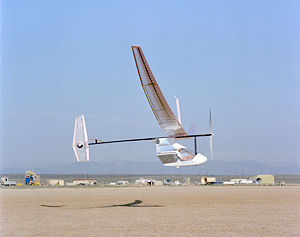- Daedalus 87
-
Das Daedalus-Projekt war ein Projekt des Massachusetts Institute of Technology, bei dem von 1986 bis 1988 von Professoren und Studenten des MIT ein Muskelkraft-Flugzeug entworfen und gebaut wurde. Ein Flugzeug dieses Typs, die Daedalus 88, flog am 23. April 1988 von Iraklio auf Kreta nach Santorin. Wenige Meter vor dem Strand von Santorin zerbrach eine Windböe das Flugzeug.
Inhaltsverzeichnis
Gebaute Flugzeuge
Es wurden drei Flugzeuge des gleichen Typs gebaut:
- Light Eagle: Leergewicht 42 kg, Spannweite 34 m, Länge 8,6 m; Prototyp.
- Daedalus 87: Leergewicht 31 kg, Spannweite 34 m, Länge 8,6 m; Absturz in Rogers Dry Lakebed am 17. Februar 1988, anschließend wieder aufgebaut.
- Daedalus 88: Leergewicht 32 kg, Gesamtgewicht: 104 kg, Spannweite 34 m, Tragfläche: 29,98 m²; flog von Kreta nach Santorin.
Prinzipieller Aufbau
Das Geheimnis der Belastbarkeit des Flugzeugs, das für seine Größe (Spannweite größer als bei einer Boeing 727) ein außerordentlich niedriges Gewicht aufwies, lag in einer sorgfältigen Materialauswahl und gründlichen Belastungstests der verschiedenen Komponenten. Der Rahmen bestand hauptsächlich aus Stäben aus Kohlenstofffaser-verstärktem Kunststoff und hochdruckfestem Polyesterschaum, die Haut aus Mylar. Getriebekästen und das gesamte Getriebe waren aus Aluminium gefertigt. Über den Pedalantrieb wurde mittels einer Getriebeübersetzung im Verhältnis von 1:1,5 ein knapp dreieinhalb Meter großer Propeller angetrieben, mit dem im Mittel 105 Umdrehungen pro Minute erreicht wurden. Über handgesteuerte Hebel konnten Höhen- und Seitenruder sowie der verstellbare Propeller betätigt werden.
Absolvierte Flüge
Den ersten Flug im Prototyp Light Eagle absolvierte die Amateur-Triathletin Lois McCallin: 1986 legte sie damit 16 Kilometer in 37 Minuten zurück. Mit der Light Eagle (intern auch „Emily“ genannt) wurden im Januar 1987 auf der Edwards Airforce Base von Glen Tremml und Lois McCallin mehrere Rekorde erflogen.
Mit diesem Flugzeug und der Daedalus 87 wurden von 1987 bis 1988 von der NASA am Dryden Flight Research Center unter anderem Untersuchungen zur Dynamik von Flugzeugen mit einer niedrigen Reynoldszahl durchgeführt. Die Ergebnisse, die aus diesen Untersuchungen gewonnen wurden, hatten einen direkten Einfluss auf das Design von vielen später gebauten, hoch und weit fliegenden Flugzeugen.
Die Daedalus 88 sollte einen Langstreckenrekord für muskelkraftbetriebene Flugzeuge aufstellen. Entsprechend der griechischen Sage von Daedalus, der mit Hilfe von Schwingen aus Wachs und Federn dem König Minos auf Kreta entflohen sein soll, führte der Rekordflug der Daedalus 88 am 23. April 1988 über eine Strecke von 115 km von Iraklio auf Kreta nach Santorin. Pilot war der griechische Radrennfahrer Kanellos Kanellopoulos. Das Flugzeug legte die Strecke in 3 Stunden und 54 Minuten zurück. Es erreichte eine mittlere Geschwindigkeit von etwa 32 km/h (bei Rückenwind).
Ausgestattet mit einem speziellen Glucose-Mineral-Mischgetränk strampelte er fast vier Stunden ohne größere Probleme durch die Luft. Etwa 30 Meter vor dem Strand von Perissa auf Santorin endete wegen einer Windböe der Flug im Wasser. Durch die Böe wurde erst das Heck mit dem Propeller und kurz darauf ein Flügel abgerissen. Der Pilot musste an Land schwimmen. Das Wrack der Daedalus 88 befindet sich heute zusammen mit der Light Eagle im Smithsonian-Institut in Washington. Die Daedalus 87 ist im Museum of Science in Boston ausgestellt.
Charakteristika der Daedalus 88
- Besatzung: ein Pilot (Kanellos Kanellopoulos)
- Länge: 8,6 m
- Spannweite: 34 m
- Tragflächengröße: 29,98 m²
- Leergewicht: 32 kg
- Startgewicht (beladen): 104 kg
- Antrieb: Pilot (Muskelkraft)
Literatur
- Gary Dorsey: The Fullness of Wings: The Making Of A New Daedalus. 1990, ISBN 0-670-82444-5.
- J. S. Langford et al.: The Feasibility of A Human-powered Flight Between Crete and the Mainland of Greece. MIT Department of Aeronautics/National Air & Space Museum, April 1986.
- S. R. Bussolari, J. S. Langford, H. H. Youngren: Flight Research with the MIT Daedalus Prototype.
- T. Shalon, J. S. Langford, R. W. Parks: Design and Sizing of the MIT Daedalus Prototype. (AIAA paper 87-2907).
- S. R. Bussolari, J. S. Langford, H. H. Youngren: Flight research with the MIT Daedalus prototype. Juni 1987 (SAE Paper #871350).
- T. Shalon, J. S. Langford, and R. W. Parks: Design and Sizing of the MIT Daedalus Prototype. August 1987 (AIAA 87-2907).
- E. E. Larrabee: The Daedalus Propeller: A Modern Application of Classical Propeller Theory. 1988.
- J. S. Langford: The Triumph of Daedalus. National Geographic, August 1988.
- Juan R. Cruz: Weight analysis of the Daedalus Human-powered Aircraft. In: Proceedings of the 21st OSTIV Conference. Wiener Neustadt 1989.
- Mark Drela: Low-Reynolds-Number Airfoil Design for the M.I.T. Daedalus Prototype: A Case Study. In: J. Aircraft. Band 25, Nr. 8, August 1988.
- R. Bryan Sullivan, S. H. Zerweckh: Flight Test Results for the Daedalus and Light Eagle Human-powered Aircraft. Oktober 1988 (NASA Grant Report).
- J. S. Langford: The Daedalus Project: A Summary of Lessons Learned. (vorgestellt bei der AIAA Aircraft Design, Systems and Operations Conference, Seattle, August 1989).
- R. Bryan Sullivan, Tom Clancy: Experimental Measurement of the Power Required to Fly the Daedalus Human Powered Aircraft. (AIAA paper 89-3385-CP).
- R. Bryan Sullivan, Tom Clancy: Power Measurements on the Daedalus Human-powered Aircraft. August 1989 (AIAA Atmospheric Flight Mechanics Conference Paper).
- R. Bryan Sullivan, Steven L. Findberg: The Flight Control System for the Daedalus Human-powered Aircraft. August 1989 (AIAA Guidance and Control Conference Paper).
- S. H. Zerweckh, Arebhf. von Flotow, J. E. Murray: Flight Testing a Highly Flexible Aircraft: Case Study on the MIT Light Eagle. In: J. Aircraft. Band 27, Nr. 4, April 1990.
Weblinks
Wikimedia Foundation.

